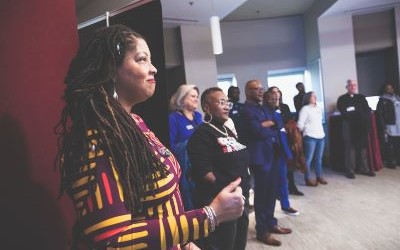Building Bridges to Prevent Violence in Baltimore and Beyond
“A wise woman once said, ‘A vision without action is a daydream. Action without vision is a nightmare,’ ” said Nadine Finigan-Carr, PhD, MS, the inaugural executive director of the Center for Violence Prevention (CVP) at the University of Maryland, Baltimore (UMB). “And since I’ve stepped into this role on May 1, I’ve worked with community members to make this vision clearer and to take action toward implementing it.”
Finigan-Carr’s remarks were made during the “Peace Is a Civil Right” open house Nov. 3 that marked CVP’s official opening in its new space on the fourth floor of the Health Sciences and Human Services Library.
Bringing together the expertise and resources of UMB and the R Adams Cowley Shock Trauma Center at the University of Maryland Medical Center, the CVP initiative was announced Sept. 6, 2022. The center’s goal is to take an interdisciplinary approach to violence prevention and intervention by combining the expertise and clinical work from Shock Trauma and the schools of medicine, social work, and law at UMB.

Dr. Nadine Finigan-Carr with guests during "Peace is a Civil Right," an open house marking the official opening of the UMB Center for Violence Prevention.
As she welcomed guests to the open house, Finigan-Carr outlined the center’s vision — to help reduce and respond to violence in Baltimore City and well beyond — and discussed the collaborative work that must happen across UMB and the greater community to make that possible. She also outlined the ripple effects of violent behavior, explaining that the center’s goal is to “interrupt and intervene” in all types of violence, specifically nonfatal aggression and assault that are precursors to deadly force.
“Gun violence and homicide, yes, they’re serious, but we need to intervene way before,” she said. “We need to intervene with child abuse and neglect. We need to intervene with intimate partner violence, with human trafficking, with all the forms of violence that are plaguing our city’s residents. We need to do that before it escalates to the level where someone’s life is ever threatened, because at that point it’s way too late.”
Finigan-Carr also emphasized that the issue of violence is concentrated on the city’s youth, saying that in urban communities like Baltimore, interpersonal violence accounts for 25 percent of injuries to young people, 45 percent of hospitalizations, and 85 percent of deaths. In noting that most of those young people live in hypersegregated, majority-Black neighborhoods, she said it’s imperative to focus in those areas, adding that the overall well-being of the city is at stake.
“The youth of today, they’re our leaders, our doctors, our innovators and our entrepreneurs, our politicians for tomorrow,” she said. “Each time we lose someone to violence, our city’s future becomes all that more bleak.”
Funded by a $2 million gift from Betsy Sherman and the Sherman Family Foundation, CVP has started its efforts to bridge programs already in place at UMB. Its initial step was the launch of a survey to identify research, practice, and/or policy projects at the University that work at the city, state, or regional level in addressing violence and promoting healing. (The survey can be found at this link.)
Because a major part of the center’s work also will happen in collaboration with community partners, Finigan-Carr began building ties with Baltimore-area organizations, including nonprofits focused on violence prevention, upon her appointment. Representatives from some of those organizations were on hand to make remarks at the open house.
Among those speaking was Erricka Bridgeford, co-founder of the Baltimore Peace Movement (formerly Baltimore Ceasefire 365) and executive director of the Baltimore Community Mediation Center, which provides free mediation services and provides training in conflict resolution across the city.
Bridgeford urged those attending the event to do more than talk publicly about ending violence.
“When nobody is watching y’all, what are you doing? What are you saying? Who are you being in this world? Who are you being in your work?” she asked and asserted that everyone present could help change Baltimore and “remind us of what our city already is, what our city already has, and that we just need opportunities to nurture and uplift it.”
Also giving remarks was Lawrence Grandpre, director of research for Leaders of a Beautiful Struggle, a grassroots think tank that advances the public policy interests of Black people in Baltimore. He said it’s important for UMB and institutions like it to become familiar with violence prevention work already happening in local communities, and to understand that the tendency of society to isolate people by individual acts ignores the “structural violence of poverty and the structural violence of radicalized discrimination and the denial of resources” that lead to violence.
“The goal is not to be competitive,” Grandpre added as he underlined the value of working together. “The goal is for all the institutions working on anti-violence in our community to work cohesively, as one organism, to lift up the city of Baltimore.”
In addition to collaborating with community organizations and nonprofits and partners within UMB, the center will work with corporations and governmental bodies as it advocates for informed policies and interventions. Baltimore City Council member Phylicia Porter, who represents District 10, spoke at the open house and hailed the ability of the center to bring multiple organizations together.
“It’s really institutions like the Center for Violence Prevention that are going to change the game here in Baltimore,” Porter said. “We are literally connecting community research to policy to government at the local state and national level — and that is the charge that we all should be looking forward to because, if not, the same cycles and the same systems will keep repeating.”



